
Alergia Astma Immunologia
Scope & Guideline
Empowering research to transform immunological practices.
Introduction
Aims and Scopes
- Allergy Diagnosis and Management:
The journal emphasizes research on various diagnostic methods and management strategies for allergies, including drug hypersensitivity and food allergies. - Immunological Mechanisms:
It explores the underlying immunological mechanisms involved in allergic reactions and asthma, such as the role of inflammatory mediators and immune responses. - Clinical Case Studies:
The publication includes clinical case reports that provide insights into unique allergic reactions and management challenges, contributing to practical knowledge in clinical settings. - Environmental and Infectious Factors:
Research on the impact of environmental factors, infections, and their interactions with allergic diseases is a core focus, highlighting how external stimuli influence immunological responses. - Innovative Therapeutic Approaches:
The journal covers advancements in treatment modalities, including biological drugs and novel therapies for severe asthma and other allergic conditions.
Trending and Emerging
- Impact of Viral Infections on Allergic Responses:
There is an increasing interest in understanding how viral infections, such as those caused by rhinoviruses and coronaviruses, influence allergic conditions and immune responses. - Biological Therapies for Asthma Management:
The exploration of biological drugs and their safety profiles for the treatment of severe asthma is a growing trend, indicating a shift towards personalized medicine in allergy treatment. - Innovative Allergen Characterization Techniques:
Research on the production and characterization of recombinant allergens and crude allergen extracts is gaining momentum, reflecting a focus on enhancing diagnostic accuracy. - Interdisciplinary Approaches to Allergy Research:
There is a notable trend towards interdisciplinary studies that integrate insights from microbiology, immunology, and environmental science to address complex allergic diseases. - Role of Microbiome in Allergic Diseases:
Emerging research on the relationship between the microbiome and allergic conditions suggests a growing interest in how gut and environmental microbiota influence immune responses.
Declining or Waning
- Food Allergy Epidemiology Studies:
While food allergies remain a critical area, the frequency of epidemiological studies comparing food allergies across regions has decreased, possibly due to a saturation of existing data. - Traditional Allergen Identification Methods:
Research focusing on conventional allergen identification techniques appears to be waning, as newer, more advanced diagnostic methods gain traction among researchers. - General Allergy Awareness Campaigns:
Public health initiatives and awareness campaigns regarding allergies, which were previously highlighted, are less frequently addressed, reflecting a shift towards more specialized research.
Similar Journals

Journal of Cutaneous Immunology and Allergy
Uncovering the complexities of skin health and allergy science.The Journal of Cutaneous Immunology and Allergy, published by FRONTIERS MEDIA SA in Switzerland, is an esteemed Open Access platform dedicated to advancing research in the intersecting fields of dermatology, immunology, and allergy. Since its inception in 2018, this journal has provided a vital resource for the dissemination of innovative research findings and critical reviews, enhancing our understanding of cutaneous conditions related to immune responses. Although currently classified in the Q4 quartile in both Dermatology and Immunology & Allergy categories as of 2023, the journal continues to strive for recognition within the scientific community, encouraging collaboration and knowledge sharing among researchers, clinicians, and experts. The journal boasts an E-ISSN of 2574-4593 and is committed to making high-quality research freely accessible to all, thus fostering greater insights into the complexities of skin-related immune disorders. Join us in this journey to explore the forefront of cutaneous research and contribute to the evolving dialogue in this dynamic field.
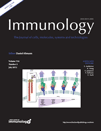
IMMUNOLOGY
Connecting Basic Science with Clinical ApplicationsIMMUNOLOGY is a premier journal published by Wiley that has been at the forefront of the field since its inception in 1958. With an impressive impact factor and classified in the Q1 quartile for both Immunology and Allergy as of 2023, this journal is highly regarded among researchers and professionals alike. It ranks 36th out of 233 in the Medicine/Immunology and Allergy category, and 40th out of 236 in the Immunology and Microbiology segment on Scopus, placing it firmly within the top percentile of its field. The journal is dedicated to publishing high-quality research that advances our understanding of immunological processes, bridging basic science with clinical applications. Although it does not operate under an open-access model, it offers conventional access options that remain integral to the dissemination of vital immunological research. With its broad scope and commitment to scholarly excellence, IMMUNOLOGY continues to serve as an essential resource for those seeking the latest advancements in immunology, fostering innovation and collaboration among scientists globally.
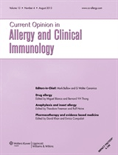
Current Opinion in Allergy and Clinical Immunology
Navigating the latest trends in immunology and allergy management.Current Opinion in Allergy and Clinical Immunology, published by Lippincott Williams & Wilkins, is a pivotal journal that serves as a key resource for professionals in the fields of immunology and allergy. With an ISSN of 1528-4050 and an E-ISSN of 1473-6322, this journal presents cutting-edge reviews of the latest research findings, methodologies, and therapeutic approaches in the management of allergic and immunological disorders. With a Q3 category ranking in both Immunology and Allergy for 2023, and a Scopus rank of #103 in Immunology and Allergy, it reflects a solid position within the scientific community. Operating in the highly dynamic fields of immunology and clinical practice since its inception in 2001, the journal aims to harmonize emerging research trends with clinical applications to enhance patient outcomes. Although it does not currently offer Open Access options, the journal's substantial impact factor attests to its significance as a scholarly resource. By disseminating high-quality reviews and expert opinions, Current Opinion in Allergy and Clinical Immunology continues to foster knowledge advancement and professional development among researchers, practitioners, and students alike.
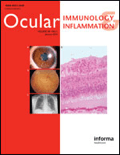
OCULAR IMMUNOLOGY AND INFLAMMATION
Transforming ocular care with cutting-edge research.Ocular Immunology and Inflammation is a distinguished academic journal dedicated to advancing the field of ocular immunology and ophthalmic inflammation. Published by Taylor & Francis Inc, this journal plays a crucial role in disseminating high-quality research findings, reviews, and clinical studies that address the complexities of immune responses in the eye and their implications in various ocular diseases. With an impressive impact factor and consistently ranking in the Q2 category in both Immunology and Allergy and Ophthalmology, it stands out as a vital resource for researchers, clinicians, and students alike. The journal's broad scope encompasses both experimental and clinical studies, ensuring a comprehensive exploration of the mechanisms and treatments of ocular inflammatory conditions. With its publication history dating from 1993 to 2024, this journal continues to be an essential reference for those seeking cutting-edge research and insights into ocular health. Researchers and professionals are encouraged to engage with the latest articles to inform their practice and advance their knowledge in this critical area of medicine.

Therapeutic Advances in Allergy and Rhinology
Exploring new frontiers in nasal health and allergy management.Therapeutic Advances in Allergy and Rhinology, published by SAGE Publications Inc, is an esteemed journal that focuses on advancing the fields of allergy and rhinology through innovative and impactful research. As an Open Access journal, it provides a platform for researchers, clinicians, and students to share significant findings and therapeutic developments aimed at improving patient outcomes related to allergic conditions and nasal disorders. The journal aims to publish high-quality peer-reviewed articles, reviews, and case studies that contribute to a deeper understanding of the pathophysiology and management of allergies and rhinological conditions. By fostering collaborative dialogue across various disciplines, Therapeutic Advances in Allergy and Rhinology plays a crucial role in enhancing clinical practice and guiding future research in this vital area of health. With an ISSN of 2753-4030, the journal continues to establish itself as a key resource for anyone involved in allergy and rhinology research and practice.
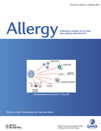
ALLERGY
Pioneering Research in Allergy and Immunological Health.ALLERGY is a leading international journal published by WILEY, dedicated to advancing the understanding of allergic diseases and immunology. With an ISSN of 0105-4538 and an E-ISSN of 1398-9995, this esteemed journal has been at the forefront of the field since its inception in 1948 and continues to publish high-quality research up until 2024. Positioned in the Q1 category for both Immunology and Allergy, ALLERGY ranks impressively within the top percentiles of its categories, underscoring its significant impact, as reflected in its Scopus rankings (#11 out of 233 in Immunology and Allergy, and #14 out of 236 in Immunology and Microbiology). Researchers and practitioners accessing this journal can expect a rigorous selection of peer-reviewed articles that address current challenges, innovative therapies, and advancements in the immunological sciences. Although it is not an open-access journal, ALLERGY remains vital for academics, healthcare professionals, and students alike, fostering a deeper understanding of the mechanisms and treatments associated with allergies.

Egyptian Journal of Pediatric Allergy and Immunology
Bridging the gap between research and clinical practice for children.Welcome to the Egyptian Journal of Pediatric Allergy and Immunology, a leading academic platform dedicated to the advancement of knowledge in the field of pediatric allergy and immunology. Published by the prestigious Egyptian Society of Pediatric Allergy & Immunology, this journal aims to address the pressing challenges and breakthroughs in the diagnosis, treatment, and management of allergic diseases in children. As a crucial resource for researchers, healthcare professionals, and students, it focuses on disseminating high-quality, peer-reviewed articles that contribute to the global understanding of allergic conditions and immunological responses in pediatric populations. Although the journal is currently not an Open Access publication, it provides a valuable gateway to research findings that can shape clinical practice and influence future investigations. With an emphasis on contributing to improved healthcare outcomes for children suffering from allergy and immunology disorders, the Egyptian Journal of Pediatric Allergy and Immunology stands out as an essential reference in the field.
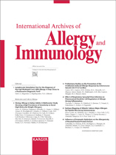
INTERNATIONAL ARCHIVES OF ALLERGY AND IMMUNOLOGY
Advancing the Frontiers of Allergy and Immunology Research.INTERNATIONAL ARCHIVES OF ALLERGY AND IMMUNOLOGY, published by KARGER, is a distinguished journal dedicated to advancing the field of immunology and allergy research. With an ISSN of 1018-2438 and an E-ISSN of 1423-0097, this journal has been a vital resource since its inception in 1950, continuing to publish influential articles through 2024. Hailing from Switzerland, it holds an important position within the Q3 category in Immunology and Allergy and Q2 in miscellaneous Medicine, reflecting its growing impact in the scientific community. The Scopus rankings showcase its relevance, with a 52nd percentile in Immunology and Allergy and 45th in Immunology and Microbiology. Although not an open-access journal, it plays a critical role in disseminating significant findings and innovations in the understanding of allergic diseases and immunological responses. The INTERNATIONAL ARCHIVES OF ALLERGY AND IMMUNOLOGY is essential for researchers, clinicians, and students eager to stay at the forefront of allergy and immunology developments.
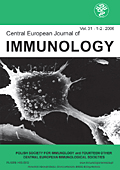
Central European Journal of Immunology
Innovating Allergy Solutions for a Healthier TomorrowCentral European Journal of Immunology is a premier publication dedicated to advancing the field of immunology and allergy research. Established in 1996 and published by TERMEDIA PUBLISHING HOUSE LTD, this open access journal has consistently provided a platform for innovative research and comprehensive reviews since its transition to open access in 2002. With an ISSN of 1426-3912 and E-ISSN of 1644-4124, it embraces a global readership while being rooted in Poland. The journal, with a notable Q3 ranking in both the categories of immunology and allergy in 2023, positions itself within the competitive landscape of scientific discourse, as reflected in its Scopus rankings. Designed for researchers, professionals, and students, the Central European Journal of Immunology not only disseminates significant findings but also fosters collaboration and innovation in the immunological sciences, making it a vital resource for those seeking to stay current in this rapidly evolving field.

Allergy Asthma and Clinical Immunology
Elevating the standards of clinical immunology research.Allergy Asthma and Clinical Immunology, a pioneering open access journal published by BMC, has been at the forefront of immunological research since its inception in 2005. With an ISSN of 1710-1492, this UK-based journal has established a significant presence in the fields of Immunology, Allergy, and Pulmonary and Respiratory Medicine, achieving notable quartile rankings such as Q2 in Immunology and Allergy in 2023. It plays a crucial role in disseminating high-quality research that advances our understanding of allergy and asthma, making substantial contributions to clinical practices and public health. The journal embraces the principles of Open Access, allowing researchers, professionals, and students from around the globe to access its content freely, thus facilitating knowledge sharing and collaboration within the scientific community. As it converges towards 2024, Allergy Asthma and Clinical Immunology continues to attract impactful studies that drive innovation and improve patient care in the face of rapidly evolving challenges in immunological health.